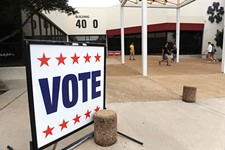Beside the Point: A Vegetative State
The City Council tries to move the budget beyond meat and potatoes
By Wells Dunbar, Fri., Aug. 18, 2006
But that's what started the food fight last week, as City Council feasted on the first of three presentations detailing the proposed 2007 city budget. As City Manager Toby Futrell has repeatedly asserted, her $525.3 million budget's emphasis is on rebuilding, boosting services and staff back to their pre-downturn levels. It's a very cautious document; against council's expressed intent, she returned with a budget funded at the so-called "effective rate" – the property-tax rate that will bring in the same total revenue as the last budget, which this year is 39.85 cents per $100 valuation. With that baseline amount, Futrell funds basic services, but leaves the carving up to council – they're faced with $7.7 million in unfunded proposals ... and any potential heat for paying for them via a higher tax rate.
Showing that Statesman flames wouldn't drive them out of the kitchen, council instead adopted 41.26 cents – the "rollback rate" or the maximum amount allowable without triggering a state-mandated citizen referendum – as the ceiling for their budget talks. Mike Martinez, establishing that the higher rate would garner an extra $8.4 million, floated the idea of a 5% homestead exemption; while acknowledging Futrell's admittedly lean assessment, he argued the exemption "wouldn't kick in until next year, so whatever [tax] rate we adopt, we're going to have that revenue to invest this year in our community." The delay would also give council time to reconcile the estimated $6 million cost of the exemption with the budget.
"I think we are all in philosophical agreement across the board that it is important we meet our responsibilities to the community," said Brewster McCracken, "meet our responsibilities to pave our roads and make sure we're scrubbing toilets in the parks." Apparently fixated, McCracken mentioned the merits of crapper-cleansing thrice more, yet the porcelain gods must have frowned upon him. Martinez's homestead exemption challenges McCracken's proposed 5% local cap on year-to-year property-tax increases, an idea that saw a little movement last legislative session before dying a little-mourned death (at least outside of Place 5). Defending tax caps as superior, McCracken dusted off one of his most unwelcome rhetorical flushers, err, flourishes – the children! – saying a homestead exemption would "cause us to have to slash our budget on things like keeping kids safe after school." "During an economic downturn," Martinez replied, "we were able to close a $70 million gap. What we're talking about here is $6 million. ... It's going to take work, but I think that's why we were elected: to make difficult decisions." With Futrell promising to run the numbers on both proposals, the skirmish shuffled off the dais but not before McCracken made one more impassioned defense of his proposal: that any savings a 5% exemption might bring to homeowners could be wiped out in year one if the tax cap stays at 10%. "If the appraisal cap were five [percent], in other words, everybody by law in the city of Austin would be paying less taxes as a homeowner ... with no budgetary impact."
The council members may have been getting ahead of themselves, however, running the risk of ruining their appetites. The day's community-services presentation – including Parks and Recreation, Library, and Health and Human Services – covered those groups hit hardest post-bust. The reinvestment is evident: new, sorely needed employees for parks; expanded hours and security at libraries; renewed graffiti abatement funds for H&HS. But also clear, and crystalized further over hours of citizen input, were the additional needs unmet at the lowest rate. Sheryl Cole described the city manager's recipe thusly: "This has been called a meat-and-potatoes budget, and I think that the hard choice that we're going to have to make is whether or not we're going to add the vegetables. ... To me that would include some of the items that have been put forth in the unfunded city manager's discussions. Of course, I recognize the need to protect the homeowner from both rising appraisals and unnecessary taxation, but the community needs to understand that there's a balance." By choosing not to box themselves in with a lower rate, council took the first needed steps of a balancing act, striving to help homeowners with rising property taxes, rebuild services, and keep the city running. After all, somebody has to do the dishes.
Or as Solid Waste Services director Willie Rhodes said during his presentation, "I assume you have dined sufficiently on the meat and vegetables and need someone to pick up the trash – so here I am." ![]()
"Point Austin" will return in two weeks.
Got something to say on the subject? Send a letter to the editor.










